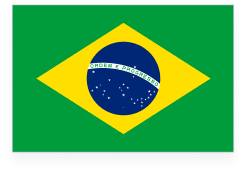My brother and I have wanted to visit Central and South America since we were very young. More specifically, we wanted to go to Brazil: him for the football (soccer, for Americans) and me for the colors of Rio Carnival.
As a teen, I was drawn to Brazilian cinema, watching movies such as City of God and Bus 174. The content was tragic, but it gave me some context and knowledge of this South American country.
As an adult, I’m still interested in visiting the Rio Carnival, but I’d also like to see other sights, such as the Christ the Redeemer statue, the nation’s white sandy beaches, and, slightly less ordinary, a Brazilian grape tree.
Here are some key facts about Brazil to get you started:
| Key Facts About Brazil | Details |
| Population | 212.8 million |
| Official Language | Portuguese |
| Currency | Brazilian Real |
| Capital | Brasília |
| Main Religion | Catholicism |
| Dialing Code | +55 |
In this article, you’ll learn fun fact after fun fact about Brazil, shining a light on the Japan-Brazil partnership, the capital, Rio de Janeiro, and the country’s unique biodiversity.
9 Fun Facts About Brazil

- Brazil is the fifth-largest country in the world
- Rio Carnival draws around 2 million people per day to its celebrations
- Brazil is home to the world’s largest rainforest
- Brazil is the only country in South America that speaks Portuguese
- Brazil has the largest Japanese diaspora in the world
- Brazil’s national dish reflects the country’s African and Portuguese culinary influences
- The yellow diamond on Brazil’s flag represents the country’s gold reserves
- Brasília is Brazil’s modernist capital city
- Brazil has won the FIFA World Cup more times than any other nation
1. Brazil is the fifth-largest country in the world
Brazil is the fifth-largest country on the planet, after Russia, Canada, the U.S. and China. It’s also the largest country in South America, making up almost half of the continent’s total land area.
Thanks to its position and scale, it shares borders with every South American country except Ecuador and Chile. It also has an impressive coastline, which runs alongside the Atlantic Ocean.
A woman enjoys her carnival experience
2. Rio Carnival draws around 2 million people per day to its celebrations
Rio de Janeiro’s Rio Carnival attracts around 2 million people per day to see colorful floats, people dancing and elaborate costumes adorned with brightly colored feathers. The first Rio Carnival was held in 1723, and it is still a must-see celebration in Brazil.

